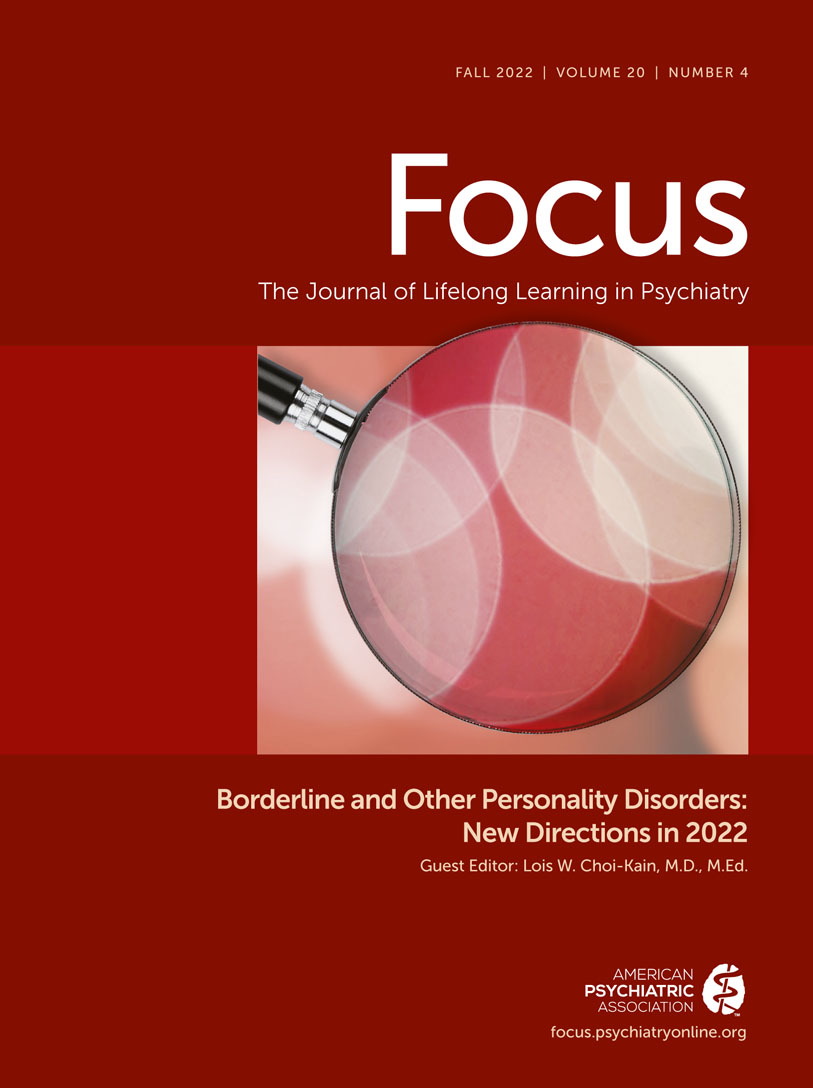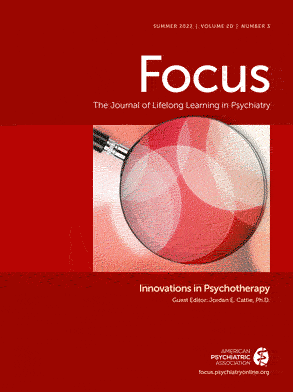Borderline Personality Disorder and Psychosis: A Case Managed by Transference-Focused Psychotherapy
Abstract
Transference-Focused Psychotherapist’s Perspective
Patient’s Perspective
The first time I remember having thoughts that might be considered unusual is when I was a child, at around 9 years old. I remember being tormented by intrusive thoughts that I might poke my eye out or stab my brother with scissors. These thoughts were disturbing and terrifying. I confided in my mother about these thoughts; she told me they were “ridiculous.” Around that time, my family was under a lot of stress. I was generally anxious and tearful most of the time, with a range of somatic complaints such as stomachaches and headaches. These disturbing thoughts were dismissed as part of the experience of these stressors. [Alt]hough my primary care provider recommended I seek the support of a therapist, my parents never pursued this option.As a teenager, I was, in some senses, well-adjusted. I excelled academically and was involved in sports and music. I was well liked and had a core group of close friends. However, I was interpersonally volatile and suspicious. I had frequent arguments with my friends, parents, and siblings. I had an unsettling feeling that I was being talked and conspired about. These thoughts were relatively innocuous—I believed my friends were plotting to exclude me from social gatherings or talking about my appearance. When I would get especially distressed or anxious, I would slam my fingers in drawers, and later claim it was an accident—this was never doubted as far as I know. I also experienced very high levels of anxiety, particularly centered around fears of my parents becoming sick or dying, that I was a “bad person” because of thoughts or impulses that I had, and that my worth was entirely intertwined with my academic achievement. My emotion dysregulation and suspiciousness appeared to be dismissed as developmentally appropriate, and we didn’t seek any professional input.When I was 17, I finished high school [and] took a year off to travel. During this time, I became obsessed with my weight and with food. I developed a preoccupation with the thought that food would make me sick. I believed I was intolerant of anything taken by mouth, including, for some time, water and medications. I stopped eating and drinking, losing a dramatic amount of weight and requiring brief hospitalization for dehydration.I entered a program that required me to regulate my food intake and maintain my weight to stay, but I remained suspicious so began purging everything I ate, either by vomiting, diuretics, or laxatives. For the next decade, I at certain times believed, when at a low weight, that the scale [was] wrong and people [were] staring at me and disgusted by me. For a time, I believed almost all food may be poisoned, and at that time, reached my lowest weight.Throughout university, I completed a rigorous double degree successfully, volunteered and worked part-time, and secured highly sought-after postgraduate employment. These successes obscured a time of intense suffering. [Although] I had friends, they were pursuing romantic relationships, something I felt incapable of. I desired intimacy but was fearful and suspicious of anyone who showed interest. I began having panic attacks occasionally, which were at times uncued and at time[s] triggered by social situations. I was referred to a psychologist who diagnosed me with generalized anxiety disorder and took a cognitive-behavioral approach, but my disturbing thoughts and my relationship turmoil persisted. Many of my childhood friends disconnected from me because I was emotionally volatile. My psychologist began suggesting that I had “borderline traits.” I was self-harming frequently to elicit care and attention from my psychologist and as a coping mechanism. After an incident [in which] I became so enraged by my psychologist’s suggestion that I had [borderline personality disorder] that I crushed a water glass in my hand (breaking it unintentionally), my psychologist decided to end treatment. I eventually received an e-mail response saying that I required a higher level of care, but he said it was “unethical” to make a referral to another clinician because I could not be contained in private practice.I felt betrayed and abandoned, but soon I found a psychologist who was comfortable working with [borderline personality disorder]. He was validating, consistent, reliable, and had appropriate boundaries. A condition of our treatment was that I consult with a psychiatrist, who diagnosed me with [borderline personality disorder] and prescribed a number of medications intended to stabilize my mood. He did not evaluate psychotic symptoms, but he provided me with a framework for stability. He made short inpatient stays available to me in place of self-harm and made communicating with him about self-harm and suicidal ideation a part of the treatment contract.At this time, I decided to leave the country for graduate school. [Although] I was not stable, I began to believe that a change was all I needed. My roommate and I began a very intense friendship. I had never allowed myself to be so close to someone—I felt a little bit crazed by obsession.This is when things started to fall apart. I was lonely again, so I clung to her desperately. Eventually, she moved out and told the dean that I was making her uncomfortable. What I heard is that the dean accused me of stalking. I was deeply humiliated and feared there m[ight] be legal repercussions. I felt I couldn’t show my face anywhere, and I became deeply suspicious of everyone, reading subtext in every statement, allowing every comment to reinforce my belief that I was defective, repulsive, bad. I didn’t go out. I didn’t attend class. The only thing I would do is walk for hours at night.One night, I called the student crisis hotline. They immediately called an ambulance, and I was hospitalized involuntarily for a week. When I was discharged, I searched frantically for treatment. Eventually, the student health center told me I should voluntarily admit myself, and the social workers on the inpatient unit would facilitate my continued treatment. I believed that I would be on an inpatient unit for a week, but was not discharged until almost 8 weeks later, with a plan for further inpatient treatment at a private hospital in another state.I was placed on a unit for “severe personality disorders.” The environment was chaotic. Many of the patients were extremely behaviorally dysregulated. There were constant alarms and crises. Claiming to be suicidal and suicide attempts were incentivized by greater attention from staff. I was judged to be high risk and placed on a one-to-one, which remained throughout my admission. I was suspicious of my psychiatrist, to whom I directed intense anger. I believed that he wanted to harm me and felt he retaliated against me when he took items away so that I wouldn’t hurt myself. I had distressing, intrusive thoughts about hurting myself. A consulting psychiatrist believed there was a mood component to my case and offered that I might have bipolar disorder. [Although] I was noted to be interpersonally paranoid, there was no suggestion of a psychotic disorder. During the next 3 months on an inpatient unit, my [medical record said] that my thoughts ha[d] a “bizarre and disturbing quality.” Yet, my primary diagnosis remained [borderline personality disorder], with no suggestion of comorbid psychotic disorders. There was speculation that there might be a trauma element to my presentation, yet I didn’t have the symptoms of [posttraumatic stress disorder]. Eventually, I was discharged to a residential treatment facility.I suddenly had access to everything I dreamed of hurting myself with. I began viciously cutting myself with razor blades, often requiring stitches. At one point, I began to be convinced that the psychiatrist in charge wanted me to kill myself. I kept this a secret for some time, avoiding him and being angry and suspicious when he talked to me.I was in and out of inpatient units 12 times over the next year, culminating in a course of ECT for “psychotic anxiety.” I eventually started to feel better and more secure, allowing myself to engage in a romantic relationship for the first time. I left to begin a new graduate program [and] was referred to my current therapist and psychiatrist [Dr. F.] as a severe [case of borderline personality disorder].At my first meeting, I knew working with him made sense. When I told him about my symptoms, he said, “Suicide is boring. I want to know what else there is to you.” I don’t think I had ever felt that level of interest from anyone before; it seemed like I had kept other clinicians hanging on with threats. He also said that if I did decide to proceed, suicide and self-harm were off the table. If I did choose to self-harm, he wouldn’t see me until I had a doctor’s note saying that I was medically cleared. This was a pretty big deterrent, since by this time I was absolutely terrified of being hospitalized, having had several distressing experiences. I haven’t self-harmed in over 3 years. I just know that’s not something I do anymore.This foundational agreement, combined with my therapist’s availability, has contained me over the past 4 years. I have remained out of the hospital. More importantly, I have finished a master’s degree and started a doctoral program, [in which] I am thriving, and [although] I still struggle with social isolation and loneliness, I have built long-lasting, trusting, and steady friendships. I trust myself not to self-destruct when faced with a setback.We have come to understand many of my symptoms as related to an underlying psychotic disorder that waxes and wanes, particularly when I stop taking my medication, but is mostly stable now at a level that allows me to function normally. When it is bad, I even become suspicious of Dr. F, but usually he is my “safe” person. This diagnosis has been hard for me to accept because I had come to identify with [borderline personality disorder], and because I always had this feeling that I could “turn off” my mental illness if I chose to. I realized that managing this disorder would always need to be intentional. I need to take my meds [sic], I need to take care of myself, and I need routine and structure. Those are nonnegotiable, and it feels unfair that for other people these things come easily, or don’t need to come at all.
Psychotic Disorder Specialist’s Perspective
Conclusions
References
Information & Authors
Information
Published In
History
Keywords
Authors
Competing Interests
Metrics & Citations
Metrics
Citations
Export Citations
If you have the appropriate software installed, you can download article citation data to the citation manager of your choice. Simply select your manager software from the list below and click Download.
For more information or tips please see 'Downloading to a citation manager' in the Help menu.
View Options
View options
PDF/EPUB
View PDF/EPUBLogin options
Already a subscriber? Access your subscription through your login credentials or your institution for full access to this article.
Personal login Institutional Login Open Athens loginNot a subscriber?
PsychiatryOnline subscription options offer access to the DSM-5-TR® library, books, journals, CME, and patient resources. This all-in-one virtual library provides psychiatrists and mental health professionals with key resources for diagnosis, treatment, research, and professional development.
Need more help? PsychiatryOnline Customer Service may be reached by emailing [email protected] or by calling 800-368-5777 (in the U.S.) or 703-907-7322 (outside the U.S.).

